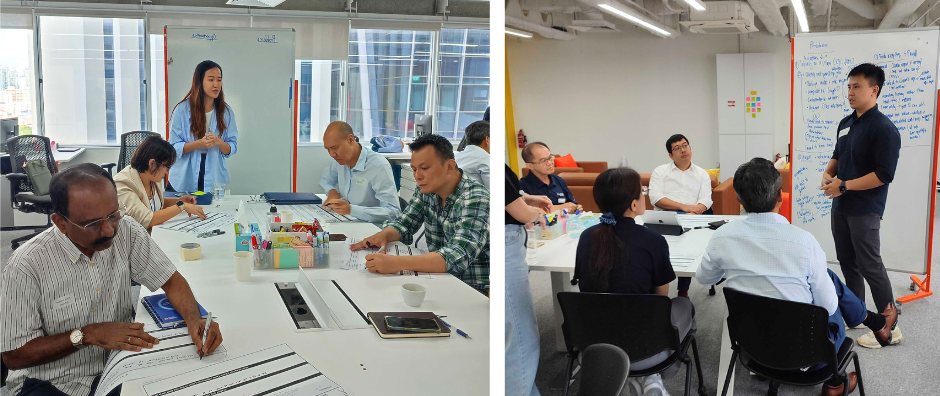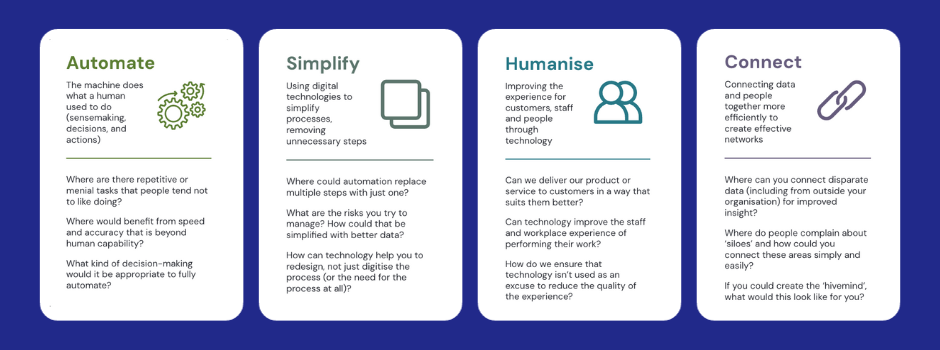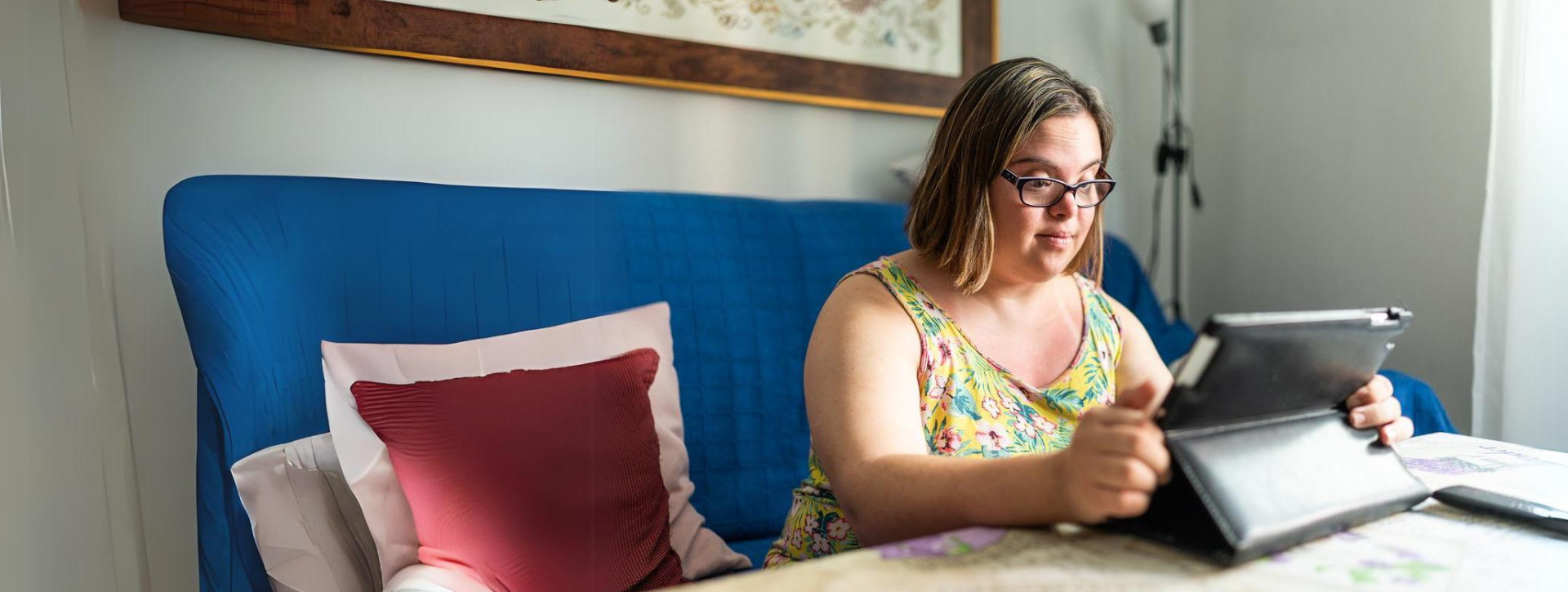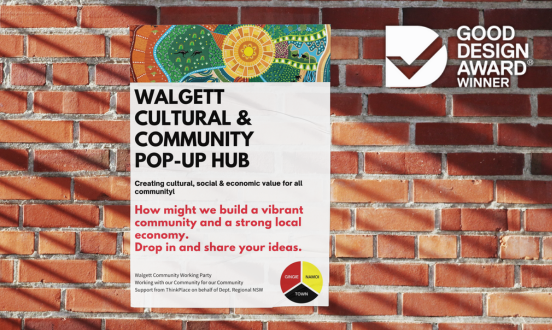Over the past decade, Singapore has made significant investments in its innovation ecosystem. The strategy is now paying off, with Singapore ranked as the most innovative economy in Asia.
One key investment was the creation of the Open Innovation Platform (OIP), which seeks to match corporates with tech solvers to harness emerging technology for high-value yet hard-to-solve challenges.
Singapore’s Infocomm Media Development Authority (IMDA), a government agency responsible for the digital transformation of Singapore, created the OIP. The OIP empowers corporates with inventive tech solutions by crowdsourcing from a global network of over 13,000 solution providers.
Since the OIP’s inception in 2018, the IMDA has engaged ThinkPlace to facilitate meaningful partnerships between corporates and tech solvers. Through applying human-centred, system-informed design methods, we have helped over 100 organisations find their technology match and rapidly develop prototypes with real-world value.

The Challenge
In theory, the OIP process is straightforward. Corporates can post their business challenge on the OIP, alongside the prize money a tech solver will receive if they can solve the problem with a working prototype. They then await proposals, and once they have received them, they pick one or more tech solvers to work with, to deliver the prototype based on agreed requirements.
When corporates enlist tech solvers to answer a business challenge through the OIP, it’s crucial that the process is intentional and the relationship is rooted in trust and a shared vision. Integrating a new technology or solution into an organisation creates a dependency – and when a corporate takes a financial risk like this, they will rightly hope for this decision to be effective, and for a positive ongoing relationship with their new technology partner.
The OIP caters for customised innovation – bespoke, novel tech solutions that harness a diverse range of emerging technologies, including generative AI, machine learning, 5G and robotics. Often, the challenges brought forward by businesses had been so far unsolvable by solutions available in the market, which was why they were willing to open them for innovative proposals via the platform.
At its heart, the OIP is about creating relationships. It seeks to reduce the cost of the search for the right innovation through a curated and growing network of tech solvers. It fosters trust through a high-touch and structured business matching process, supported by IMDA, and provides a layer of ‘interpretation’ to bridge the gap between the business and technology worlds. The OIP is also a means to de-risk a corporate’s innovation journey. The prize model helps businesses to have some certainty that they will receive a working prototype which they can test and continuously innovate on.
Similarly, the exposure to corporate demand and reputation boost for tech solvers increases their incentive to participate. It provides a pathway to scale and commercialisation. The OIP supports both parties with a range of innovative know-how tools along the journey, including ThinkPlace’s design facilitation.
Our Response
Tech solutions absorb a large amount of time and resources, so they must be sustainable and consider the human impact, right from their inception.
In this ongoing project, we work closely with the OIP to enact a thorough five-stage design and innovation process.

ThinkPlace’s role on the platform sees us supporting mostly through Steps 1, 2 and 3.
The first step has us helping corporates effectively frame their business challenge. In practice, this is usually a three-hour session with an organisation, clarifying and sense-checking their problem statement. By getting a deep appreciation of the corporate’s roadblocks and existing processes, we can flexibly use systemic and human-centred design thinking techniques to eventually frame the challenge in a way that is both clear and appealing for potential solvers, and deliver real value for the business.
Weaving ethical considerations – such as data privacy and employee and customer respect – into this initial brainstorming session ensures the buzz and promise of new technology doesn’t cloud judgement on its human impact.
In Step 3, after the tech solver has been selected, we bring the partners together to scope the prototype. This means revisiting the challenge together, alongside the new affordances provided by the technology, to establish aligned parameters between both parties for what constitutes a ‘successful’ prototype. This process results in clear KPIs for the award of the full prize (a proportion is paid out upon initial selection).
In some cases, ThinkPlace also provides support during prototyping, either in the form of UX/UI advisory, or ongoing design thinking support to ensure that the prototype will deliver the value required. For startups in the technology world, this coaching can be highly valuable.

The Impact
Since the OIP’s inception, it has hosted over 300 challenges worth more than $15 million in prize money, and established a network of over 13,000 tech solvers, with a growing list of successful innovations. It has catalysed key partnerships and fast-tracked their progress to solve problems. It is one element of Singapore’s strategy to be the go-to hub for open innovation in Asia.
ThinkPlace is proud of the ongoing impact we have through the platform. Our ability to draw on a suite of methods, including human-centred design, systems thinking, risk thinking and diverse domain experience, has meant we’ve earned a reputation for fast, pragmatic design with platform participants. As experts in emerging technology, we’ve brought value as:
- A sense-maker: helping participants sort through and sharpen their thinking, and ensure the right problem is being solved
- An interpreter: bridging the gap between business and technology perspectives
- An accelerant: helping teams break through and converge on a practical way forward
We are also proud to have brought a strong framing around public good, ethics and human-centeredness. It’s easy when under pressure to get carried away with technical considerations. We always ensure that we ask the question ‘Maybe we can do this, but should we?’ By using thorough design thinking techniques, we have shown that tech solutions can be meaningful, sustainable, and profitable.
The OIP continues to generate results, supporting Singapore’s already-thriving tech hub, amidst a consciously-created digital innovation ecosystem. To see some of the success cases from the platform, head here.







